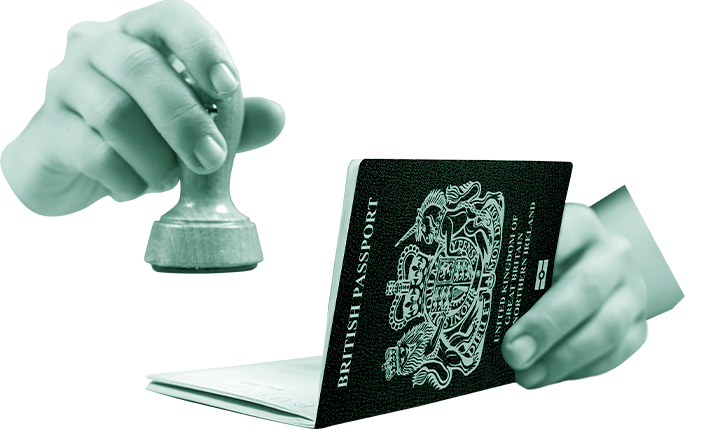Let's Talk

Need Help Urgently?
Call our 24 hour rapid response team now on 0333 311 1090
Request a callback
"*" indicates required fields


The UK Secondment Worker visa is made for today’s workplace. It shows how businesses can move globally. This visa lets companies from other countries send their workers to the UK for a short time. This is great for sharing knowledge and skills. Now, let’s look at what this visa offers, what you need to get it, and how to apply. This way, you can have a successful experience with a UK secondment.
The UK Secondment Worker visa allows skilled workers from foreign companies to work in the UK for a short time. This visa is part of the Global Business Mobility routes. These routes aim to bring global talent and investment to the UK. The visa lets international companies send their employees to the UK for certain projects or to start a business there, all while following UK immigration rules.
This visa is good for both employers and employees. Companies can hire talent from around the world and share knowledge within their teams. Employees get a chance to work internationally, learn new skills, and grow their careers globally.
In simple terms, ‘secondment’ means moving an employee from their regular job to another organization or a different place within the same company for a short time. For the UK Secondment Worker visa, an overseas business sends one of its employees to work for a UK sponsor for a set period.
The UK sponsor might be a branch, a subsidiary, or another company that has a contract with the overseas business. A secondment worker stays registered with their overseas company while they work in the UK.
The main goal of this visa is to help skilled workers come to the UK. They can work on projects, share their knowledge, and strengthen ties between the UK and their overseas company. This process enables international teamwork and helps both the sending and receiving organizations through sharing skills and knowledge.

Central to the UK Secondment Worker visa is sponsorship. A UK organization must sponsor the overseas employee’s visa application. To do this, the UK organization needs to get a sponsor licence from the Home Office.
Once they have this licence, the sponsor can give a Certificate of Sponsorship (CoS) to the secondment worker. This certificate is a formal invitation. It confirms that the UK organization will follow all rules related to employment and immigration.
The Home Office carefully checks these applications. They only allow real businesses with a true need for secondment workers to hire overseas employees. This process helps protect UK jobs while allowing skilled professionals to enter the country.
Getting a UK Secondment Worker visa takes careful planning. You need to pay attention to details, gather the right documents, and know the eligibility requirements.
When you prepare well, you show you are ready. This can greatly increase your chances of a smooth and positive visa application process.
When you submit your visa application, it’s very important to include the right documents. These documents are proof of your eligibility and help the Home Office check your application properly. If your paperwork is not complete or has mistakes, it could slow down the process or even lead to a rejection.
Usually, you will need a valid passport, proof that you work for the overseas company, the Certificate of Sponsorship (CoS) from your UK sponsor, and proof that you can support yourself financially in the UK. Also, the job you are applying for must be on the list of eligible occupations and require specific skills.
Every job has its own occupation code. Your UK sponsor will use this code when they give you the CoS. It’s a good idea to check that your sponsor picks the right code for your job. This helps avoid confusion between your CoS and your visa application form, making the process smoother.
Financial stability is very important when applying for a visa. The Home Office needs to see that you can support yourself financially in the UK without using public funds. This means you must show proof of your finances to get a visa.
You usually need to provide bank statements for a few months. These should show that you have enough money in your account. The amount of money needed can change, so it’s good to check the current financial limits. You can find this on the official UK government website or ask an immigration advisor for help.
Besides your personal bank statements, you might need some other supporting documents. These could be letters from your overseas employer about your salary or a letter from a sponsor who confirms they will support you. Remember, having clear and complete documents will help you during the visa application process.
Applying for a visa can feel overwhelming, but it doesn’t have to be. This easy-to-follow guide will help you with the UK Secondment Worker visa. It breaks the process into simple steps.
If you follow this guide, you can approach your application with confidence. You will have a clear plan to help you through each step.
Before you start your UK Secondment Worker visa application, there are important things to remember. First, make sure to check the eligibility requirements carefully. This will help you see if you meet all the needed criteria. These requirements include your job history with your overseas employer, the type of business your sponsor has, and if you can financially support your time in the UK.
Your UK sponsor is very important in this process, so working closely with them is a must. Keeping in touch is vital. Talk about the timelines, what documents you need, and any problems that may come up.
After your sponsor gives you a Certificate of Sponsorship (CoS), make sure to write down your unique reference number. This number is essential as you’ll need it for your online application form. You should also gather all necessary documents, like your passport, employment contract, and proof of your finances. Having everything organized will help make the process easier for you.
The key part of your application is the Certificate of Sponsorship (CoS). This certificate comes from your sponsoring organization in the UK. It is more than just a paper. It shows that the UK organization supports your visa and your secondment. Your journey to work in the UK starts by getting this important document.
Your UK sponsor must have a qualifying contract or investment with your overseas employer. This must meet certain standards. These standards may include minimum contract amounts and proof that the business relationship is real.
When the contract or investment is set up, your UK sponsor can assign you a CoS. This is not just a simple task. Your UK sponsor must use a CoS from their yearly limit. This shows they can employ you under the Secondment Worker visa.
The UK has a points-based immigration system. To get a visa, you need to earn points. Several factors help you get points, such as your job, skill level, and salary. These factors show you meet the UK immigration rules.
As a skilled worker, you will be judged on things like having a job offer from an approved UK sponsor. Your role’s skill level and whether your job is on the eligible occupations list also matter. It is important to understand this system. You want to know if you qualify and if you can meet the minimum points needed.
Your UK sponsor is very important in helping you get enough points. They have to use the right occupation code when they give you your Certificate of Sponsorship (CoS). This code needs to show your skills and job description correctly. Doing this right helps avoid problems with the visa application process.
With your Certificate of Sponsorship (CoS) ready and a good understanding of the points-based system, you can move forward with your UK Secondment Worker visa application. You can fill out the application mainly online at the Home Office’s official website.
The online form will ask about your personal details, job history, travel history, and why you want to work in the UK. It’s very important to be clear and complete when filling out this form. If you miss details or include wrong information, your application could be delayed or turned down.
Make sure that the information on your application form matches the supporting documents you provide. Consistency in all documents can boost the credibility of your application and improve the chances of getting approval for your UK Secondment Worker visa.
Imagine your supporting documents as the strong pillars of your visa application bridge. If you don’t have them, the bridge might fall apart. Before you send in your application, make sure you gather all the needed documents. These usually include your passport (with at least one blank page), the CoS, and proof that you meet financial requirements.
One way to show you can support yourself while staying in the UK as a Secondment Worker is by providing bank statements. These statements should cover a few months. They must show enough money to pay for your living costs.
Also, keep in mind that the Home Office needs all documents in English or Welsh. If your documents are in a different language, you must have certified translations. This will help you avoid delays in your application process.
After you have sent in your online application and paid the fees, it is time to book a biometric appointment. This appointment usually takes place at a visa application center. You will need to provide your biometric details, like your fingerprints and a photo.
The Home Office uses this information to confirm your identity and make your Biometric Residence Permit (BRP). This permit is your identity document while you are in the UK. This step helps keep the UK’s immigration system safe and secure.
When you go to your biometric appointment, make sure to take your appointment confirmation, passport or travel document, and any other papers the visa application center asks for.
After you submit your application, it’s normal to feel a mix of excitement and worry as you wait for the Home Office’s decision. Knowing how the visa approval process works and what could happen can help make the wait easier. It allows you to get ready for any result.
While you wait, it’s a good idea to learn about different outcomes. These can range from an easy approval to a request for more information. By staying prepared, you can have a smoother transition to your secondment in the UK.


While you may feel excited about starting your UK secondment, it is important to understand how long the processing takes. The Secondment Worker visa, like other visas, needs a certain amount of time for the Home Office to review and process all applications.
Processing times can change. They depend on how many applications the Home Office gets and how complex each case is. Usually, you can expect a decision in a few weeks. It is best to apply ahead of your planned travel date.
If you need a quicker response, the UK has a Priority Service for some visa types, including the Secondment Worker visa. This service costs extra but gives you a faster decision, usually in a shorter time.
In some situations, the Home Office may need to conduct an interview for your visa application. Not every applicant will be interviewed, but it’s a good idea to be ready for this. Think of it as a chance to clear up any questions and strengthen the details you provided in your application.
During the interview, a UK immigration officer will ask about your background, the reason for your stay, and your plans in the UK. They want to confirm what you said and see if your intentions are genuine. Be honest, clear, and confident during this time; these traits will help you.
If you get an interview request, collect all your important papers. This includes your passport, Certificate of Sponsorship (CoS), employment contracts, and proof of finances. Having these documents ready will make you feel more prepared and boost your confidence during the interview, which can improve your chances of success.
Congratulations on your visa application and your arrival in the UK! As you start this new journey, it is important to know your rights and responsibilities as a Secondment Worker. This will help you have an easy and legal stay in the UK.
You should understand your limits, like rules about certain benefits and looking for different jobs. Knowing your rights is also key. This includes working for your sponsoring organization and getting healthcare.
Being aware of the details of the Secondment Worker visa is important for a smooth experience in the UK. This visa allows you to work for your sponsor, but it has some rules that set it apart from other worker visas.
For example, you may not be able to get certain public funds or benefits that other residents can. It’s important to understand these details beforehand to prevent any confusion or issues.
You may have the right to bring your family to the UK. This includes your spouse or civil partner and dependent children. However, they can only stay if their dependent visa applications are successful.
Staying compliant with UK immigration rules during your secondment is very important. You need to meet your reporting duties. This usually means telling the Home Office about any big changes in your situation.
Changes could include moving to a new address, changes in your job, or extending your stay once your visa is about to expire. Reporting these updates on time helps you follow the immigration rules and avoid any problems later on with your visa applications.
It’s also important to stay in touch with your UK sponsor during your time there. They are essential for keeping your visa valid. They can help you understand what you need to report and can communicate with the Home Office for you if necessary.
Your career goals might change during your time abroad. This can lead you to look for ways to extend your experience in the UK. You may think about extending your visa or switching to a new type of visa. It’s very important to know what your choices are.
Keep in mind, applying for a visa extension or changing to a different type of visa has tight deadlines and rules. Start this process early, before your current visa ends, to keep your legal status in the UK.

If you want to stay longer in the UK on a Secondment Worker visa, it’s important to know the rules for getting an extension. Being aware of these rules can greatly impact your application.
Firstly, your UK sponsor needs to want to keep sponsoring you. This shows that your skills are still needed and that there’s a current work agreement between your overseas employer and the UK sponsor.
Also, you must show that you are still working on the same project or assignment that let you get your first secondment. This shows that your role with the sponsoring organization is still important.
If your career goals change and you want to look into options beyond your current position, switching to a different UK visa category might be a good choice. The UK’s immigration system allows you to switch visas under certain conditions. This gives you a chance to find new opportunities within the UK.
There are several visa categories, each with its own eligibility requirements that could work for you. The Skilled Worker visa is a common option for those who have a job offer from a UK employer that agrees to sponsor them.
When you switch visas, you need to go through a separate application process while still in the UK. Remember, your eligibility for the new visa category and the success of your application depend on meeting all requirements. This can include things like work experience, qualifications, and salary levels.
In conclusion, knowing how the UK Secondment Worker Visa works is very important for a successful stay in the UK. You need to find a sponsor and go through the visa approval steps carefully. Each part needs careful attention. To make the application smoother, meet the visa needs, get your documents ready, and follow the reporting rules. It helps to know this information whether you want to extend your stay, change visas, or look into options for dependents. If you need help or have questions about the UK Secondment Worker Visa, just contact us. We want to make your move to work in the UK easy.

The UK Secondment Worker visa is a work visa for skilled professionals. It is for people who work for companies outside the UK. This visa lets them come to the UK to work for their overseas employer on a project or assignment. They will still be employed by the overseas company. This visa is part of the Global Business Mobility routes. It helps skilled workers move between offices around the world.
A key point is that a UK sponsor is needed. The sponsor must have an eligible contract with the overseas employer and give the applicant a Certificate of Sponsorship (CoS). The UK Secondment Worker visa helps with sharing knowledge, skills, and teamwork between businesses in the UK and those from other countries.
To qualify for the UK Secondment Worker Visa, you need to meet a few key requirements. First, you should be employed by a company outside the UK and have worked there for at least one year before you apply. This shows that you have a good relationship with the employer who is sponsoring your secondment.
Second, the UK organization that will hire you must be a licensed sponsor approved by the Home Office. They must give you a proper Certificate of Sponsorship (CoS), where they explain the terms of the secondment and state what your job will be. You also need to show proof that you are financially stable. This means you need to have enough money to take care of yourself while you are in the UK, so the Home Office knows you won’t need public funds.
A key part of the UK Secondment Worker visa is having a strong contract between the overseas employer and the UK sponsor. This contract sets the stage for the secondment. It shows the business connection between the two and tells why the UK Secondment Worker’s skills are needed.
To get this visa, the contract has to meet certain standards, often needing a good amount of money involved. This rule makes sure that only real and important business deals can use this visa option.
Also, the contract must clearly explain the project or task the UK Secondment Worker will do while in the UK. This detail proves the real need for the worker’s time in the UK and how it helps the business partnership.
Securing a sponsor is very important for the UK Secondment Worker visa. The UK organization needs to have a valid sponsor licence from the Home Office. This licence shows that the organization is ready and able to meet its responsibilities as a sponsor. This includes following immigration rules and keeping track of an employee’s work in the UK.
The organization provides a Certificate of Sponsorship (CoS). This certificate acts as proof of the job offer and confirms the secondment details. It is a legal agreement between the sponsor, the Secondment Worker, and the Home Office.
The sponsor must keep good records of the Secondment Worker’s employment. This includes tracking attendance and reporting any big changes to the Home Office.
Not all jobs can qualify for the UK Secondment Worker visa. The Home Office has a list of eligible occupations. This list shows which jobs can get sponsorship under this visa. These jobs usually need special skills and knowledge. They highlight the need for skilled workers in the UK.
Each job on the list has a specific occupation code. It is very important for the UK sponsor to use the right occupation code that matches your job on your Certificate of Sponsorship (CoS). This is crucial for a successful visa application and helps avoid misunderstandings.
It is a good idea to check the list of eligible occupations regularly because it can change. Always look at the most current version on the UK government’s website for updated information.
Proving that you have enough money is very important when applying for any UK visa, including the Secondment Worker visa. You need to show the Home Office that you can support yourself while in the UK without using public funds.
To do this, you usually need to provide bank statements for a specific time. These statements should show that you have enough money to pay for your living costs. It’s a good idea to keep a steady balance in your account and avoid large, unusual transactions. These can cause issues during your application.
You can also include other papers to help your application. For example, a job letter that shows your salary, or a letter from your sponsor that confirms they will support you financially during your secondment. These can show that you are ready for your time in the UK.


When you apply for a UK Secondment Worker visa, you need to collect many documents to support your application. Think of these documents as building blocks. They help to clearly show your background, travel purpose, and connections to your home country.
Besides the basic items like a valid passport, the UK Secondment Worker visa application form, and your Certificate of Sponsorship (CoS), you must also provide proof of your job with the overseas sponsor. This proof can include employment contracts, pay slips, and a letter from your employer that confirms the secondment. You also need to show you are financially stable. This is usually done with bank statements that show you have enough money.
The process to apply for a UK Secondment Worker visa is mostly online. This makes it easy for people around the world to apply. You should begin by going to the official UK Visas and Immigration website and making an account.
After you log in, fill out the online application form carefully. It is important to make sure all the information is correct. Also, upload the needed supporting documents. This helps to make sure your application is complete and ready for the next steps.
After you submit your application and pay the fees, you will need to book an appointment at a visa application center. During this appointment, you will give your original passport. You will also provide biometrics like fingerprints and a photo. This is all part of the necessary verification steps.
Applying for a UK Secondment Worker visa has some fees you need to know about. First, there is the visa application fee. This fee goes toward the costs of processing your application. Next, there is an Immigration Health Surcharge (IHS). This extra fee gives you access to the UK’s National Health Service (NHS) during your visit.
Remember, these fees cannot be refunded, even if your application does not get approved. You may also have extra costs to consider, like paying for courier services to send back your passport or translating your supporting documents. Make sure to include these expenses in your budget to get a clear view of the total cost. You can check the official UK Visas and Immigration website for a full list of current fees.
The UK Secondment Worker visa lets you live in the UK for a set time. This time is usually based on how long your project or assignment lasts. However, the most time you can spend on this visa is two years. This period shows that the visa is meant for temporary stays and is different from visas that allow you to stay permanently.
The Secondment Worker visa does not lead to indefinite leave to remain (ILR) in the UK. But, you might be able to switch to a different visa, like the Skilled Worker visa, if your situation allows it. It’s a good idea to talk to an immigration advisor. They can help you look at your choices and find the best plan for your future career in the UK.
If your project or assignment in the UK takes longer than you expected, you might be able to stay longer with a Secondment Worker visa. But, getting an extension is not guaranteed. You need to submit a new application to the Home Office.
To improve your chances of getting an extension, make sure you meet all the eligibility requirements. Your UK sponsor must be ready to keep sponsoring you, and your overseas employer should still need you for the ongoing project. Showing strong proof that your skills and knowledge are important for the project can help your application succeed.
The UK Secondment Worker Visa has clear rules about changing jobs or employers. This visa links you to the sponsoring organization and the project mentioned in your Certificate of Sponsorship (CoS). Because of this, you usually cannot switch employers while on this visa.
If your work situation changes for any reason, you must contact the Home Office right away. Trying to change jobs or work for another employer without permission can break your visa rules. This may risk your chances for future UK visa applications.


One benefit of the UK Secondment Worker visa is that you can bring your family along. Your spouse, civil partner, unmarried partner, and dependent children under 18 can join you.
Each family member needs to apply for their own dependent visa. They must meet certain eligibility criteria. This includes proving your relationship, showing you are financially stable to avoid using public funds, and making sure your accommodation in the UK is safe for the family.
The UK Secondment Worker visa is a temporary visa. It does not lead to indefinite leave to remain (ILR) in the UK on its own. This visa is meant for short-term work assignments. It does not give a direct way to settle in the country.
If you want to live in the UK permanently, you should look at other options in the UK immigration system. You can switch to a different visa category that helps with settlement. For example, the Skilled Worker visa might work for you if you meet the specific requirements.
The UK’s Global Business Mobility visa category includes different paths that help businesses from all over the world. One path is the UK Expansion Worker visa. This visa is for overseas businesses that want to start working in the UK.
Another option is the Senior Worker visa. This visa lets senior managers or specialists from other businesses come to work in the UK for a certain time. It aims to bring in skilled people who can help improve the UK economy.
Additionally, there is the Seasonal Worker visa. This visa allows people to come to the UK for specific temporary jobs, mostly in farming. It helps meet the need for seasonal workers and supports important industries.
To become a UK Secondment Worker under the Global Business Mobility route, you need to show a strong link with your overseas employer. A key way to do this is by meeting the overseas work requirement. This means you must have worked with your overseas employer for at least one year before you apply.
This rule helps to confirm that the UK Secondment Worker has a real and solid connection with the overseas business that is sponsoring their secondment. The one-year period provides a way to assess your work history. It shows the value you bring and the legitimacy of the secondment plan.
To get a UK Secondment Worker Visa through the global business mobility route, you need a Certificate of Sponsorship (CoS) from your UK sponsor. This CoS has information about your job and employer. Your UK sponsor must have a license to sponsor overseas workers. The CoS is very important for your visa application. It includes key details like your start date, occupation code, and salary. This document is required by the UK’s immigration rules. It helps ensure that skilled overseas workers are being hired properly and transparently.
The UK Secondment Worker visa application depends on having a real job that fits the specific rules for this type of visa. The Home Office carefully checks applications to make sure the job offer is not fake or set up just to get around immigration rules.
The organization that is sponsoring the visa must provide clear proof to the Home Office. This proof shows that the role in the Certificate of Sponsorship (CoS) is a real job that needs the skills of the skilled worker. The evidence may include a clear job description, required qualifications, and details on how the secondment helps meet the company’s goals.
It’s very important to prove that the job offer is genuine for a successful application. This ensures the UK Secondment Worker visa route is used correctly. It helps bring real skilled workers who can support the UK economy.

As part of the UK’s points-based immigration system, the Global Business Mobility – UK Secondment Worker visa requires that the job meets a certain skill level. This rule makes sure that people coming to work in the UK have the skills needed to help the country’s economy and job market.
The job you will do needs to be at or above Regulated Qualification Framework (RQF) Level 6. This is the same as a bachelor’s degree or having similar work experience in a relevant area. This rule prevents the visa from being used for jobs that local workers can easily fill. It aims to attract skilled workers to the UK.
The UK Secondment Worker visa has an unspoken salary expectation. The Home Office looks at the offered salary to see if the job is real and matches the needed skill level. This helps them decide if the applicant can get this visa.
It’s a good idea to make sure that the salary is in line with what others are paid for similar jobs in the same industry and area in the UK.
The Immigration Skills Charge applies to the UK Secondment Worker route under Global Business Mobility. This is a fee that UK sponsors must pay for each overseas worker they hire. The money collected from this charge helps to fix skills shortages in the UK. It does this by funding training and apprenticeship programs for UK residents.
It is important for sponsors and applicants to understand this charge. Sponsors need to include this cost when planning their budgets for hiring from abroad. Applicants should know about this charge as it is part of what their sponsor needs to do.
The financial rule for the Global Business Mobility – UK Secondment Worker visa focuses on being self-sufficient. If you apply, you need to show the Home Office that you have enough money to support yourself when you first arrive in the UK. This rule stops you from needing public funds and helps you pay for your living costs comfortably.
The amount you need can change depending on your situation. Usually, you will need to provide proof that you have money in your bank account for a certain time before applying. This proof can include bank statements or a letter from your employer that confirms they will support you financially.

The UK Secondment Worker visa under Global Business Mobility does not require English language skills. This is because secondment jobs often need special skills and experience. Sometimes, knowing the language is not the most important factor for these roles.
To get a UK Secondment Worker Visa, you need to find a UK sponsor and get a Certificate of Sponsorship from your overseas employer. This means you will have to apply for a visa through the Home Office. You must follow the Immigration Rules and meet all the eligibility criteria. Once your visa is approved, it lets you work in the UK under the Secondment Worker route. This is a great chance for skilled workers to help UK businesses. It is important to manage the start date of your job and the end date of your visa during this whole process.

The time you can stay on a UK Secondment Worker Visa depends on the details in the Certificate of Sponsorship (CoS) given to you. Usually, this visa allows for flexible stays based on how long you are employed. It is very important to follow the rules set by the UK sponsor and the Home Office to stay compliant during your time on secondment. Knowing how long you can stay is key for both employers and overseas workers for a smooth and legal secondment experience.
The UK Secondment Worker Visa is part of the global business mobility routes. It allows people to stay in the UK for up to 5 years. During this time, overseas workers can help UK businesses and enjoy a new working environment. This duration supports the goal of promoting international exchanges and sharing skills within companies. After the 5 years, visa holders can look at options like changing their visa or applying for settlement. These choices depend on their job goals and what their employer needs. This flexibility is a big benefit for anyone wanting long-term chances in the UK.
To follow the rules, UK secondment worker visa holders must meet certain conditions during their time in the country. They must work for their sponsor in the job stated on their Certificate of Sponsorship (CoS). They also need to earn a salary that meets the going rate for their occupation code and keep their visa status valid. It is very important to follow the UK immigration rules. These rules prevent access to public funds and doing voluntary work without permission. To have a successful stay in the UK, following these conditions is key.
After meeting the eligibility criteria and finishing the required time on a UK Secondment Worker Visa, people can think about settling in the UK. This process is called Indefinite Leave to Remain (ILR). It lets Visa holders live and work in the UK without any limits. To qualify for settlement, applicants must follow the immigration rules. They also need to show a genuine need to stay and meet certain requirements about where they live, their criminal record, and their English skills. Getting settlement allows people to have long-term residency rights in the UK.
Dependants of people applying for a UK secondment worker visa can join them under the global business mobility route. These dependants usually include spouses, civil partners, unmarried partners, and children who are under 18. They need to apply for their visas separately. However, they can either join or accompany the main visa holder in the UK. To have a successful visa application, they must meet certain criteria and provide required documents. These may include proof of relationship and evidence of financial support. Family members can live in the UK while the secondment worker takes care of their job responsibilities.
To participate in the global business mobility route, UK sponsors must get a sponsor licence from the Home Office. This important step lets them support overseas workers for the secondment worker visa. The application process requires meeting certain criteria and submitting needed documents. When businesses obtain a sponsor licence, they can help skilled workers move. This can improve their global operations. Following the sponsor licence application rules also helps employers and employees during changes in international business.
Can family members join me during my secondment in the UK?
Family members can come with you during your time in the UK if they get a dependant visa. This visa lets them live, study, and work in the UK. Make sure they meet the eligibility criteria and have the required documents to apply successfully.
What happens if my secondment is extended beyond the visa validity?
If your secondment lasts longer than your visa is valid, you need to apply for an extension before your current visa ends. If you don’t, it may cause legal issues that could impact your stay in the UK.
How does Brexit affect the UK Secondment Worker Visa?
Brexit impacts the UK Secondment Worker Visa. It may change the rules and requirements for workers. This will affect how easily people can move between EU countries and the UK. After Brexit, new immigration policies could make it easier or harder for global business mobility. This will influence how workers get and keep these visas for global business.
We are always happy to talk about any legal concern you may have regarding criminal law matters.
Get In Touch

Call our 24 hour rapid response team now on 0333 311 1090
"*" indicates required fields
"*" indicates required fields